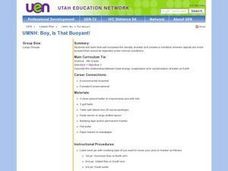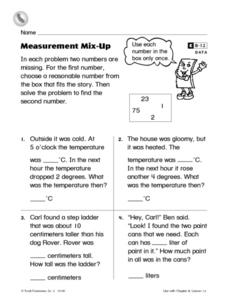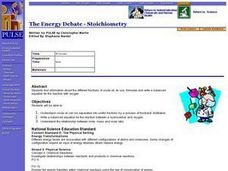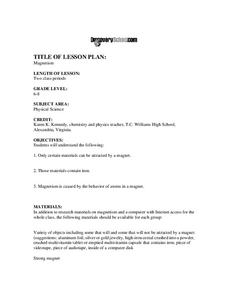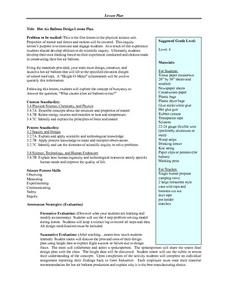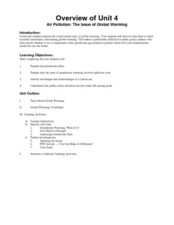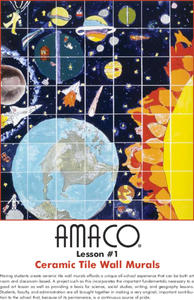Curated OER
Boy, Is That Buoyant!
Fourth graders see that salt increases the density of water and creates a condition wherein objects are more buoyant than would be expected under normal conditions. They describe the relationship between heat energy, evaporation and...
Curated OER
What a Can Can Do
Students explore properties of cans (including aluminum and steel) as they rotate through stations. They experiment with magnets, weight differences, resistance to corrosion and temperature conductivity.
Curated OER
Convection Currents
Students explain and understand the circulation of air in the atmosphere. They identify that energy can be carried from one place to another by heat flow or by waves, including water, light and sound waves, or by moving objects. ...
Mascil Project
Closed Greenhouses
Controlling the efficiency of a greenhouse is a mathematical task. A collaborative project challenges learners to create an efficiency plan for a closed greenhouse. Using algebraic equations, they consider a set of constraints, design...
Santa Monica College
The Composition of Potassium Chlorate
The third lesson in a series of 11 begins by using thermal decomposition of potassium chlorate to determine the mass percent of oxygen. Then a second activity allows scholars to demonstrate that the resulting residue is from a...
Curated OER
Causes, Effects, Solutions
Students research two key topics. In this environment lesson, students review the greenhouse effect and global warming. Students form groups and research questions about these two topics. Students present their answers to the class.
Curated OER
Mineral Mixtures
In this science worksheet, students use basic scientific concepts to complete the series of puzzles that are intended to increase science literacy for classifying types of rocks and minerals.
Curated OER
Measurement Mix-Up
For this measurement worksheet, 2nd graders read 4 word problems and find the two numbers missing in each one. Students choose a reasonable number from the box that fits the story for the first number and then solve the problem to find...
Curated OER
The Energy Debate - Stoichiometry
Students determine crude oil can be separated into useful fractions by a process of fractional distillation. They write a balanced equation for the reaction between a hydrocarbon and oxygen.
Curated OER
Magnetism
Students experiment with the concept of magnetism. Working in small groups, students design an experiment to test the magnet attraction of various substances. After completing their experiments, students research magnetism and it's...
Curated OER
My Car Has Potential
Seventh graders investigate how changes in the mass or height of a ramp can affect the change in potential energy. They discuss the concepts of work and energy, then using the four question strategy, they design an experiment that...
Curated OER
Hot Air Balloon Design Lesson Plan
Sixth graders discuss what they know and what they want to know about hot air balloon using a KWL chart. They then use a wide array of materials to design a hot air balloon that will lift successfully in cooperative groups referring to...
University of Georgia
Energy Content of Foods
Why do athletes load up on carbohydrates the evening before a competition? The lesson helps answer this question as it relates the type of food to the amount of energy it contains. After a discussion, scholars perform an experiment to...
Desert Discovery
Leaping Lizards
Here is a fine biology instructional activity that introduces youngsters to reptiles. They study their feeding habits, their habitats, and the adaptations they must make to survive in their environments. The outstanding instructional...
National Energy Education Development Project
Introduction to Wind Energy
The U.S. produced enough wind energy in 2015 to power all of the homes in Alaska, California, Delaware, the District of Columbia, Hawaii, Idaho, Maine, Montana, Nebraska, New Hampshire, North Dakota, Rhode Island, South Dakota, and...
American Chemical Society
Changing State: Evaporation
Why do experiments require a control? Guide scholars through designing an experiment to see what they can do to evaporate water faster with a lesson that stresses the importance of controlling all variables. The second activity allows...
Curated OER
States Of Matter
Delv into the states of Matter. Students engage in the scientific inquiry process to uncover the exciting world of Matter. They watch a series of videos, and conduct experiments in order to collect and analyze data on the various state...
National Wildlife Federation
When It Rains It Pours More Drought and More Heavy Rainfall
Which is worse — drought or flooding? Neither is helpful to the environment, and both are increasing due to climate change. The 16th instructional activity in a series of 21 covers the average precipitation trends for two different...
Virginia Department of Education
Metals, Nonmetals, and Metalloids
How can one easily classify metals, nonmetals, and metalloids? Pupils answer this question as they experiment with unknown substances and perform tests on conductivity, brittleness, and malleability to determine which unknown belongs in...
National Wildlife Federation
The Tide is High, but I’m Holding On… Using ICESat Data to Investigate Sea Level Rise
Based on the rate of melting observed from 2003-2007 in Greenland, it would take less than 10 minutes to fill the Dallas Cowboys' Stadium. The 17th activity in a series of 21 has scholars use the ICESat data to understand the ice mass...
Curated OER
The Sun, Moon, and Our Solar System: Teacher/Student Notes
Introduce basic Earth and space science to your budding astronauts. This handout works in two ways, the first part provides information about the sun, moon, eclipses, and Earth to be read to or by the class. The second part is composed...
Curated OER
The Search for El Nino
Sixth graders complete an El Nino scavenger hunt. In this earth science activity, 6th graders describe the conditions that create El Nino and compare it to normal condition. They discuss how this phenomenon affects marine ecosystem.
Curated OER
Air Pollution: The Issue of Global Warming
Here is an outstanding 10-page lesson plan on global warming. Learners discover that there is a lot of controversy surrounding this topic in that the science behind global warming is difficult to prove. The best thing about this plan is...
American Art Clay Co., Inc.
Ceramic Tile Wall Murals
Science, social studies, language arts, and art classes work together with administrators to produce a permanent, ceramic tile wall mural to install at their school.
Other popular searches
- Physics Heat and Temperature
- Science Heat and Temperature
- Heat and Temperature Test
- Temperature and Heat
- Heat and Temperature Change
- Heat and Temperature Metal
- Heat Energy Temperature Burn
- Temperature Heat Expansion
- Temperature Scales and Heat
- Heat and Temperature Unit
- Temperature Heat
- Temperature Flow of Heat


